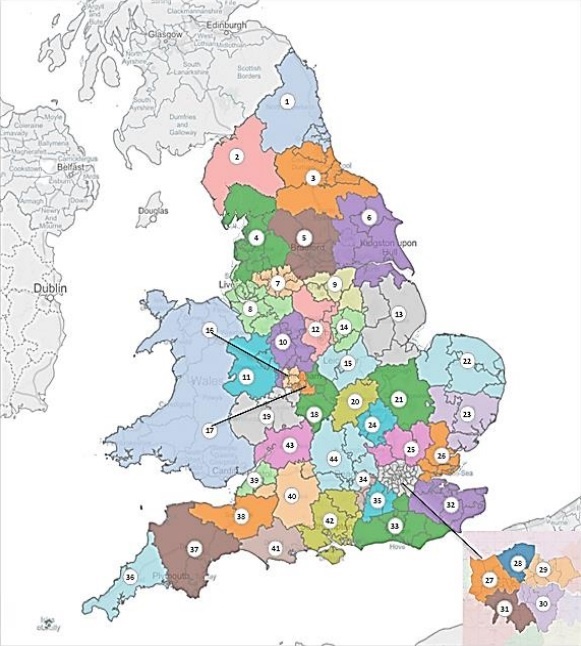16.03.16
‘Sustainability’ patches and leaders revealed, but providers need freedom
Health and care bodies across England have outlined details of the 44 ‘footprint’ areas, and their leaders, that will be responsible for developing local sustainability and transformation plans (STPs) – but providers are warning that these plans will fail without a greater joined-up approach from national bodies.
Nominating a single person to oversee and co-ordinate the STP process, to “get a sense” of the scale of the challenges in local areas, were part of key pre-Easter targets to get access to NHS England’s £1.8bn bailout fund.
There are nearly five CCGs per designated footprint, and the majority of footprints fall in the midlands and the east, despite populations in London and the north being denser.
There are some major names amongst the list of eight nominated leaders responsible for steering this hefty planning process, including the co-chair of NHS Clinical Commissioners, the president of Solace, and the chief executives of major city councils. The full list is as follows:
- Dr Amanda Doyle OBE, GP, chief clinical officer of NHS Blackpool Clinical Commissioning Group and co-chair of NHS Clinical Commissioners (Lancashire and South Cumbria footprint);
- Sir Andrew Morris, chief executive of Frimley Health NHS Foundation Trust (Frimley Health footprint);
- Angela Pedder OBE, chief executive of the Royal Devon & Exeter NHS Foundation Trust (Devon footprint);
- David Sloman, chief executive of the Royal Free London NHS Foundation Trust (North Central London footprint);
- David Smith, chief executive of NHS Oxfordshire Clinical Commissioning Group (Buckinghamshire, Oxfordshire and Berkshire West footprint);
- Sir Howard Bernstein, chief executive of Manchester City Council (Greater Manchester footprint);
- Mark Rogers, chief executive of Birmingham City Council and President of the Society of Local Authority Chief Executives (Birmingham and Solihull footprint); and
- Toby Sanders, accountable officer of NHS West Leicestershire Clinical Commissioning Group (Leicester, Leicestershire and Rutland footprint).
The remit of these leaders vary greatly, with populations ranging from 300,000 in west, north and east Cumbria to nearly three million people in Greater Manchester. Several of the five local areas within London are in line with county boundaries.

Simon Stevens, chief executive of NHS England, said: “Now is quite obviously the time to confront – not duck – the big local choices needed to improve health and care across England over the next five years, and STPs are a way of doing this.
“Their success will largely depend on the extent to which local leaders and communities now come together to tackle deep-seated and long-standing challenges that require shared cross-organisational action. The NHS nationally will be working closely to support them in doing that.”
Jim Mackey, chief executive of NHS Improvement, who had previously indicated that 2016 would be a time for major transformations in the health service, added that improvement relies on strategic working within local ‘health economies’.
“We need the STPs to encourage organisations to work together, to think boldly and to work out how change – no matter how radical – can best be achieved to meet the major challenges we face,” he added.
The place-based ‘sustainability’ plans were designed to focus on collaboration and joined-up services while moving away from detrimental organisational autonomy. According to NHS England, it will go beyond “just writing a document” and cannot be outsourced or delegated, instead just relying on strong leadership.
As promised, national health bodies are also publishing guidance and templates to support these areas in submitting information about their governance and their priorities by 15 April. This will come just a few months before final plan submissions in June.
Providers ‘need freedom and support’
But despite the ongoing momentum to make “seismic changes” to the way the NHS addresses local needs, the majority of NHS Confederation members warned that national bodies must improve to ensure plans can go ahead.
Rob Webster, the outgoing chief executive of the Confederation, said 86% of members feel national bodies “work in a contradictory way”, with the majority feeling policies “do not support local transformation”.
Providers have also signalled that they need the “space and support” to encourage and strengthen partnership across localities – with 61% of members responding to a recent survey arguing that a lack of maturity in local relationships is a major barrier to joint planning.
“National bodies have an important role to play in supporting and enabling local leaders to foster critical local relationships that will determine the fate of these plans,” said Webster.
“What must be avoided is excessive control from the centre, which would stifle local ambition to transform local health and care services. For the leaders announced, and in the coming weeks, they will need the freedom, flexibility and support to drive forward the service changes that best fits their local areas.”